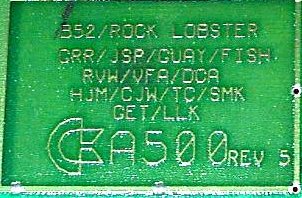
Mystery Motherboards

Since the A500 was launched many have wondered about the
mysterious messages that have appeared on the Amiga motherboards.
Were they a secret code passed to the Amiga disciples or
meaningless jibberish? The truth was somewhere in between - the
mysterious words were song titles. The tradition was started by
George Robbins - the man responsible for most of the low end Amiga
systems and continued by other Commodore employees. Robbin's
handiwork was immediately recognisable by the B52's song title. His
first Amiga project - the A500 - was originally developed under the
working title of B52 and the trend continued to four subsequent
models:
| A500 |
"Rock Lobster" |
| A600 |
"Junebug" |
| A1200 |
"Channel Z" |
| A590 |
"Party Mix", the front LED's called Fred and Wilma |
B52 fans and curious Amiga users can purchase their greatest
hits album "Time Capsule: Songs For A Future Generation", featuring
Rock Lobster, and Channel Z. Sadly, Mr. Robbins passed away in the
early hours of April 26th, 2002. A memorial web site has
been setup in his honour.

The tradition was continued by the designers of the CD32 who added
the word "Spellbound" onto the motherboard. This broke away from
the B52's and was obviously added by a different person. Spellbound
is a song by Siouxsie and the Banshees. These were an English band
formed in 1976, releasing the title on their Ju-Ju album and as a
single during May 1981. They disbanded during 1996. The lyrics
summarise the CD32 as the first 32-bit console that will "entrance"
game players.

Unseen messages
In an online conference during 1996 Dave Haynie gave some idea of
the changes they were forced to make regarding motherboard
messages, as well as those found on the designs that never made
it.
Well, there weren't that many "sayings" on my
motherboards, we generally stuck to code names. The best saying was
on the A2000 prototype, Rev 2 or 3. This was something I did in
1986. In '85 and '86, we had a devistating round of layoffs at C=,
based on the fact that the C64/C128 were aging and C= had paid
buckets of money for Amiga. So on the bottom of the A2000 PCB was
inscribed "The Few, The Proud, The Remaining", and below that, the
initials of everyone left in Engineering. Henri Rubin made us take
it off, so all you see is the "HAYNIE/FISHER" on the top of that
corner (Terry Fisher did the PCB layout). Every motherboard has a
code name. Everything George Robbins worked on was some reference
to the B-52's. I had "The Boss" (A2000), "The Edge" (A2630), "B2"
(A3000, Hedley named it), "Gemini" (an experimental multiprocessing
Zorro III card), "Nyx" (the AAA prototype), and others I can't
think of at the moment.
Spellbound is ©1999-2000 Ryan E. A.
Czerwinski, All Rights Reserved, Used with permission
BACK
Last Update:8/3/2002
|













